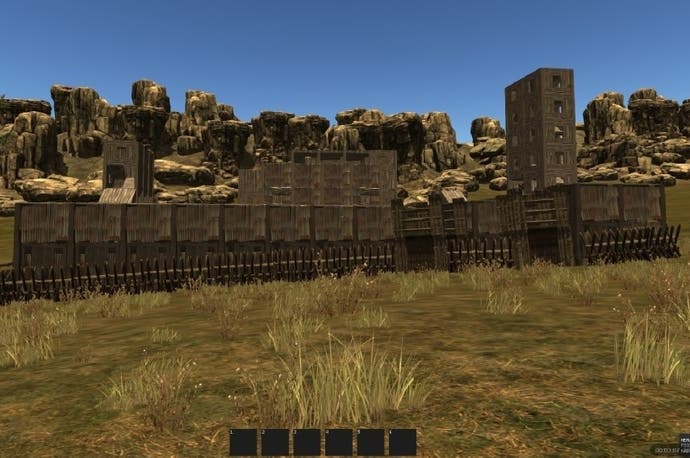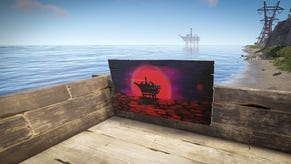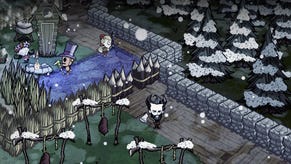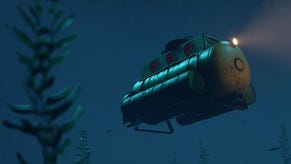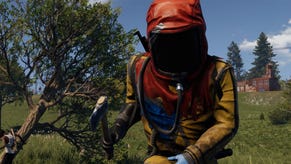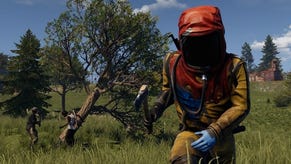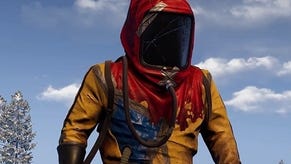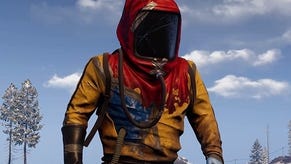The story of Rust
How Garry Newman's team went from mod success to early-access phenomenon.
Garry Newman doesn't really dress things up. You'd likely have guessed that much from the name of the game that earned him his fortune. Garry's Mod, the sandbox created from Valve's Source engine that has supported Newman for coming up to a decade, is a brilliantly blunt bit of titling. That much you'd also get from a brief phone conversation with him one sunny Tuesday morning, his flat West Midlands firmly placing him in his Walsall base. It's an office still reeling from the shock of the success of Rust, Newman and the team at Facepunch's first public-facing offering since Garry's Mod. He's got a wonderful knack of stumbling into phenomenons, has Newman.
"I'd just quit my job," Newman recalls of his life pre-Garry's Mod, before quickly correcting himself. "No, I got fired from my job. I was working on a dating website as a programmer, and I got fired as I set up my own rival site, which is fair enough. I'd have fired me as well. I weren't that bothered anyway as I was making more money from my own site, so I was basically doing that and working on a game called Facewound."
It seems he's always had a way with names. Facewound was a simple 2D side-scrolling shooter ("It was fun, but there weren't much to it"), and while it never saw release it provided invaluable coding experience. "I made the engine from scratch, and it's experience you can't really buy." It was enough to give him the courage to tinker with Valve's Source engine, which had just launched alongside Half-Life 2. When he finally had something to show for his work, late in 2004, the response was overwhelming.
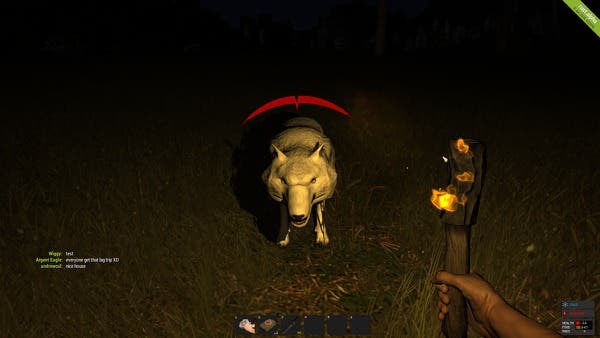
"I released the first version on Something Awful's forums, and it got hundreds of replies in a couple of hours, which I couldn't believe, so I kept working on it and it got bigger and bigger. Some of the websites picked up on it and it got bigger and bigger." Newman was taken aback by the astronomical take-up. "Even when it was taking off I was still working on Facewound thinking that was the game that was going to make me money. And if I could just make £200 off this game then I'd be alright."
I'm not sure how much money exactly Garry's Mod has made in the nine years since, but a conservative estimate would put it in the millions. It could have been an even bigger number, too, had Newman taken to charging for the mod from the off - for a long time, he couldn't quite understand Valve's advice to put a price on his work. "They asked me if I was up for selling it on Steam, and I was like, who the f***'s going to buy that? I think that was my exact reply - it's free, so why would anyone buy it? But then a few months later they asked again and I thought I might as well."
Garry's Mod has been more than just supporting Newman in the nine years since - it's allowed him to form a studio, surrounding himself with people from the community and expanding the scope of the mod. It's also earned him a fair lump of cash, too. "It's been holding the company up, really, and we've got more money than we know what to do with. We've hired people, and we've changed people's lives. People who've played Garry's Mod and become modders, we've paid them and helped the community out so they can carry on doing what they're doing. It has kind of changed a lot of people's lives."
"They asked me if I was up for selling it on Steam, and I was like, who the f***'s going to buy that?"
Newman's life has changed, too. Having turned 30 not too long ago, and having settled down with a house, girlfriend and child, a different set of priorities have moved in, leading him to change the way that Facepunch works. "I want to do less work, really," he says with admirable honesty. "I kind of want to make the company run without me. There's a push to employ people, really, and to push the company to the next level."
Facepunch Studios has some 20 people employed, with around 14 of them working out of the Walsall office. The structure's a little like Valve in that there's no real structure at all. (Indeed, Newman once had an unsuccessful phone interview with the Seattle outfit: "I think they figured out pretty quickly that I had no idea what I was doing. I'd probably be kicking myself now if I'd actually got a job at Valve. I doubt I'd have half the money I have now.") At Facepunch, every programmer's got their own prototype project they're allowed to pursue, though they don't always come to light: Rust, the survival game that's proved a phenomenon since its release on Steam Early Access last December, is the first project since Garry's Mod to make it into the public's eye.
"We liked the Hitman games, and we had an idea called Cash for Kills. It was kind of a Hitman game, but more serious, and more sandbox-y. Do you remember that JFK game? Our idea was more like that. You had to really plan, and every bullet had an effect. It was going to be a web-based game, so you've got to kill this bloke at 9pm at this location, so you'd actually have to be online at 9pm and be there at that spot to get him. We were working on that, then we figured this ain't working. Then we played DayZ and said let's make a version of DayZ - we've got the engine, and it can be kind of used for that."
"We want to avoid changing what we're doing, because what we're doing is what got us where we are."
Rust is more than a clone, obviously, but its main point of departure from DayZ was design born through circumstance. One of DayZ's greatest assets is the world it's inherited, the sprawling map of Chernarus dense with detail and rich with atmosphere. "We couldn't recreate that - it was three people at the time, and it would have taken years - so we came up with the idea of letting users create the world. And that's where it started. It just makes sense for how many people we've got."
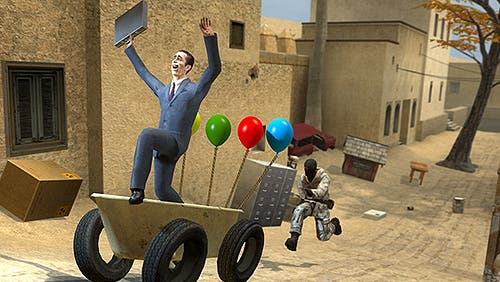
And so Rust, which can brusquely be described as a blend of DayZ's open-world survival ethos and Minecraft's creative impulse, was born. Its world of bleak survival leaves large gaps for players to fill in, either with creations of cruelty or a sense of community, making it a fascinating study in human behaviour even in its unfinished state. And players are rushing in to fill those gaps - Newman revealed a short while back that Rust, in its short time online, has raked in 40 per cent of what Garry's Mod has in its lifetime to date. A couple of weeks later, and that's quickly crept up to some two thirds. "That kind of success, it's a massive shock to us. That's half why we were so shocked at the massive popularity of it."
The influx of people has also meant an influx of voices demanding new features. Rust's still very early in its alpha state, and it's now playing the precarious balancing act between the demands of the players and the vision of the designers. "It's kind of one of those things where we want to avoid changing what we're doing, because what we're doing is what got us where we are. But at the same time we've got all this money now, so let's hire a few people who can specialise in what Rust really needs. It's the kind of way we've worked, and we always have with Garry's Mod. It was kind of finished and it was kind of early-access - after it was released, I worked on it for eight years. It's the way we've learned to work, and I couldn't imagine any other way to do it."
So what's next for Rust? Newman, quite wisely, won't be drawn on timelines or roadmaps that could come back to haunt him in the future, and so doesn't want to explicitly spell out what to expect ("If you say anything to anybody, it's going to come back and bite you in the arse"). But already, with the help of the players, there are some fascinating directions presenting themselves. "We've been trying to think of things like why don't people kill each other in real life? Because there's a police force - so we should set up a system so servers can set their own police force up, and have this man is wanted and this one's a murderer and we need to kill him. We want to empower the players really. I don't think we want to add a system as such - we want players to be able to add them systems rather than us say this happens when you do this. The player should have to investigate murders and things like that."
And what next for Newman, and for Facepunch? After the success of DayZ, Dean Hall famously took a sabbatical inspired in part by his love for extreme survival that bleeds into his game. So will Garry and his team follow suit, riffing on the phenomenon of its often sadistic game, and take a break to enslave random Russians in makeshift huts? "Ha ha, not quite," laughs Newman. "We ain't going to get to the moon or anything."
